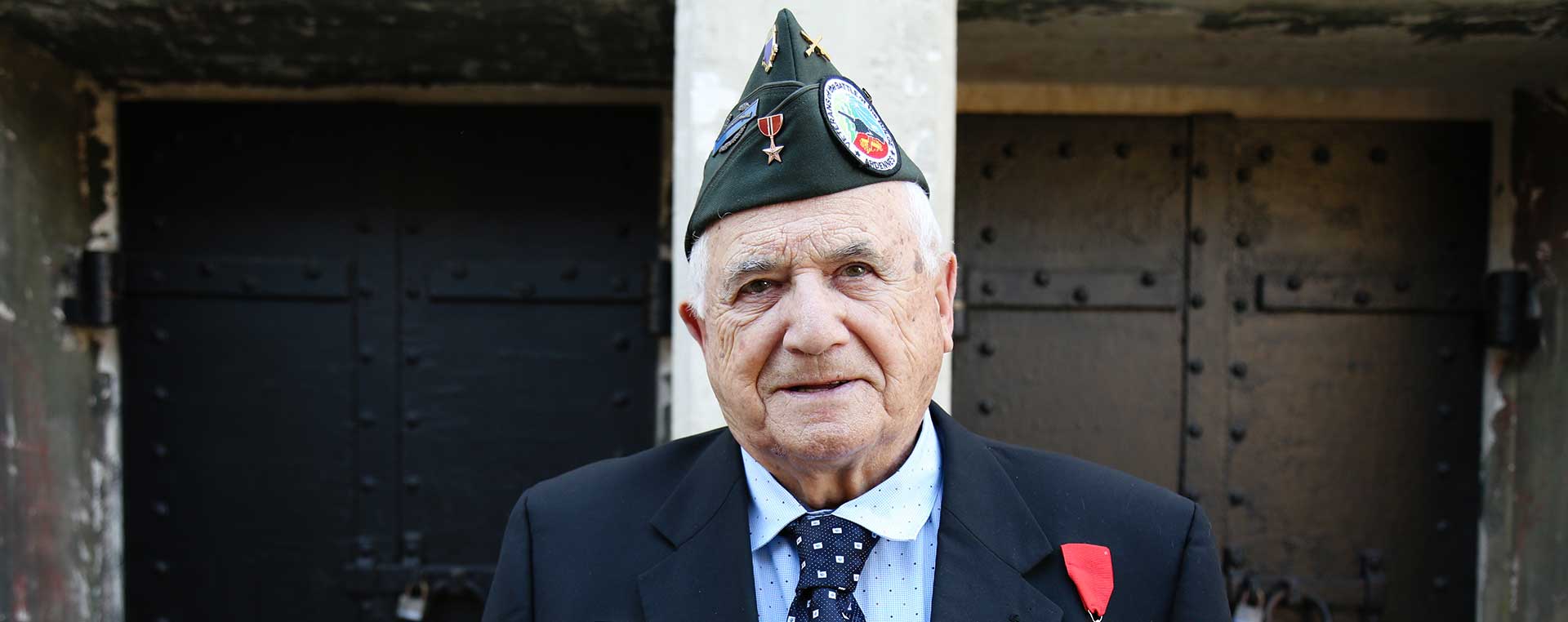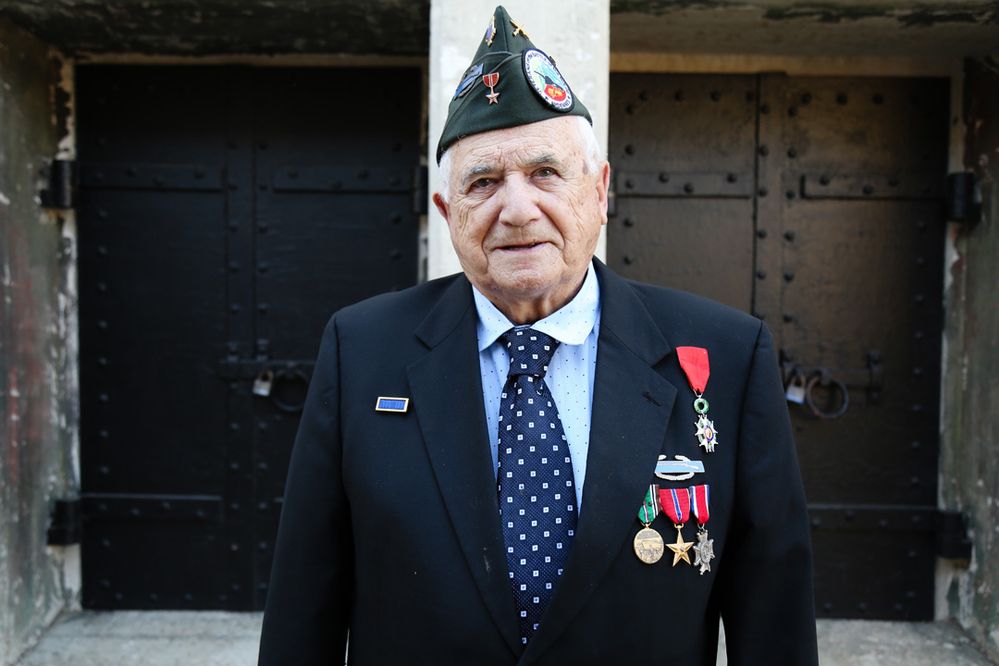
In honor of Veteran's Day, and thanks to the efforts of the Call of Duty Endowment and The Greatest Generations Foundation, we are honored to present this interview with John Foy. Mr. Foy proudly served with General Patton's Third Army during World War II and saw action across Europe, including at the Battle of the Bulge. We would like to thank him, and all Veterans, for their service. Be sure to check out "Brotherhood," our first in a video series with several Veterans from World War II who we were lucky to spend time with.
Activision Games Blog: Thank you for joining us, Mr. Foy. Where are you from?
John Foy: I'm from Rochester, New York, and I've lived there all my life.
Were you drafted or did you enlist?
I enlisted in 1943. I was sort of a smart-ass kid in high school, which I probably shouldn’t say. What I mean is that I was sort of a smart kid in high school (chuckles), and they had this program ASTP, Army Specialized Training Program, and they brought us into the Army. The idea was to get the guys that were on the smarter end of the scale, send them to college for two years, and in two years they would cover a four-year college course.
They gave me my choice of MIT, Harvard, Yale, Princeton, and Cornell. Here I am, a 17-year-old kid, and I chose Cornell not because I thought it was any better than the other schools, but because it was reasonably close to home. I had never been away from home before.
Niagara Falls is like maybe 70-80 miles from Rochester, my home. If we made a trip to Niagara Falls, it was something you talked about all year. It was a big deal because people just didn't travel. This was way back in the middle of the Great Depression. The worst depression our country has ever had. So, very few people traveled. Nowadays, talking to the young high school guys, they are like ‘Well, I just got back from Italy last week.’ Their friends say, ‘Yeah, so what?’ Because everybody does it.
How long was your training?
Well, the thing is they were starting to get heavy infantry casualties at the time over in Europe. So, they decided they needed infantrymen more than they needed engineers, so away we all go to infantry training. And there was something like, across the country, about 160,000 guys in the program I was in, and they all went right into the infantry. But there were terrible casualties. Probably about half of them got killed.
Where did you train?
I went down to Fort Benning, Georgia for infantry training, and when I got done with that, I was assigned to the 87th Infantry Division. We went over to Europe on the Queen Elizabeth, which was amazing. Almost 15,000 men in our division were on one ship. We were in England not very long, maybe only a month or so, and then into France.
This was after the invasion, perhaps a month, six weeks, or something like that, after the Army had advanced. They were halfway across France by the time we joined them. We were assigned to General Patton's Third Army, so I fought with Patton in the Saar Valley, the Alsace section of France, which is south of Metz and Nancy, in there.
Then we got the fine news one day ‘We're moving out. We're going north. Where we going? I don't know, we're just going.’ And then we found out that the Battle of the Bulge had started. Like I said, we really didn't know where we were going. During the whole war, you have soldiers in the infantry 50 yards that way and 50 yards the other way. That was our whole war to us. That's all you know.
The rest was just rumors flying around. But we left the Saar Valley, and turned it over to another division and went up to Bedford, Belgium. It just seemed strange. We were driving by the big cathedral, the Reims, in France. This was Christmas Eve, and the midnight mass was just letting out, and here we are roaring down the street right in front of the cathedral. It was such a strange feeling.
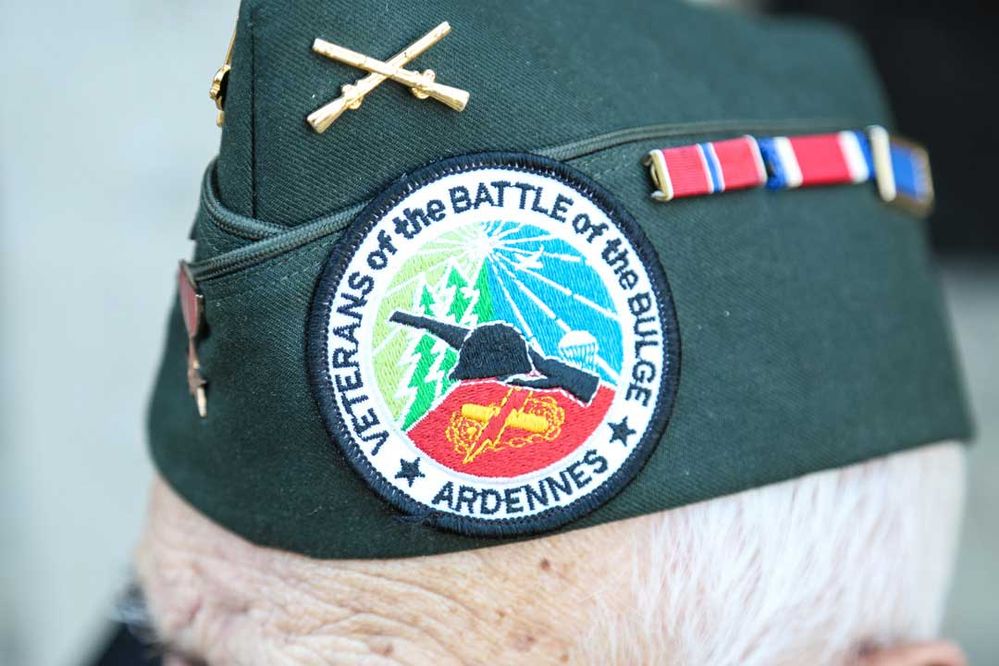
Where did you end up?
We ended up in Belgium, just outside of Bastogne. The 4th Armored Division had, just that day, finally broken through. But all they had was just one narrow road, and the Germans were trying to close that road up again. That was our job to keep that road open. The Germans were coming around Bastogne from the north, around Bastogne, and we were on the southwestern side of it. And our job was to hold them back and keep them from closing that road off. And we did. It was terrible bad up there though. Our company went in with about 200 men, and we come out with 40 or 50. Casualties were terrific in there.
So, you were a machine gunner?
Yes, that was my primary job.
What were the specifics of your weapon?
Well, it was the machine gun made for our Army back in 1914 for World War I. It was still the same machine gun. I doubt mine was made back in 1914, but they weren't new by any means. They may have been made new, but it was still the old patent, the same machine gun, although it was fairly reliable. It was a little bit slower than what the Germans were using. My machine gun would fire 650 rounds a minute. The German machine gun, the MG 42, would fire 1200 rounds a minute.
You mentioned earlier that you found a very small blowtorch which you put to an alternate use during the war. How did you find it?
I don't know, I just picked it up in an old farmhouse or something that we were fighting towards. It was a really small one, and it held less than a pint of gas. A regular blowtorch will hold a good quart. This one, I took it with me it primarily to heat a cup of coffee, eat a can of beans or something. That's what I brought it for.
But when we were going up against German pillboxes, I wondered if it might work against them. I tried using the pump from the blowtorch to shoot a stream of gas through one of the air vent, and when the gas was almost gone, I told the guy next to me, ‘Okay, light it,’ and he sticks a match into the stream, and the stream goes into the pillbox and I hear a dull thud. Not an explosion, just a real dull thud inside the building, and the heavy black smoke just poured out and the Germans came running out.
You mentioned losing some of your brothers in arms during the Battle of the Bulge. Were you able to forge those same bonds with other soldiers later?
Not too much, because my original squad was completely wiped out except for me, and I kept getting new guys coming in. By then, I was a buck sergeant in charge of the machine gun section. But then we finally crossed the Rhine River, we had quite a battle there, and the company commander thought I was getting a little bit shaky. And I was, I guess. So, he gave me what he said was a soft job, and I was put in charge of the security around battalion headquarters.
Now battalion headquarters in the infantry is probably about a quarter of a mile back from the actual front lines. Maybe a little bit more than that sometimes, and I was in charge of security there. Now, I’m not sure if I’d call this a ‘soft’ job, because after we crossed the Rhine, we were moving very fast. And the front line infantry would just bypass some units instead of fighting with them. They would say, ‘The hell with them,’ and go right on by and let the rear echelon take care of them.
So sometimes, the Germans that they had bypassed would come in on us at night at battalion headquarters. We would wind up having a pitched battle with them, and sometimes I'd have to call down to the regular infantry companies down the line and have them send a platoon back to help us out.
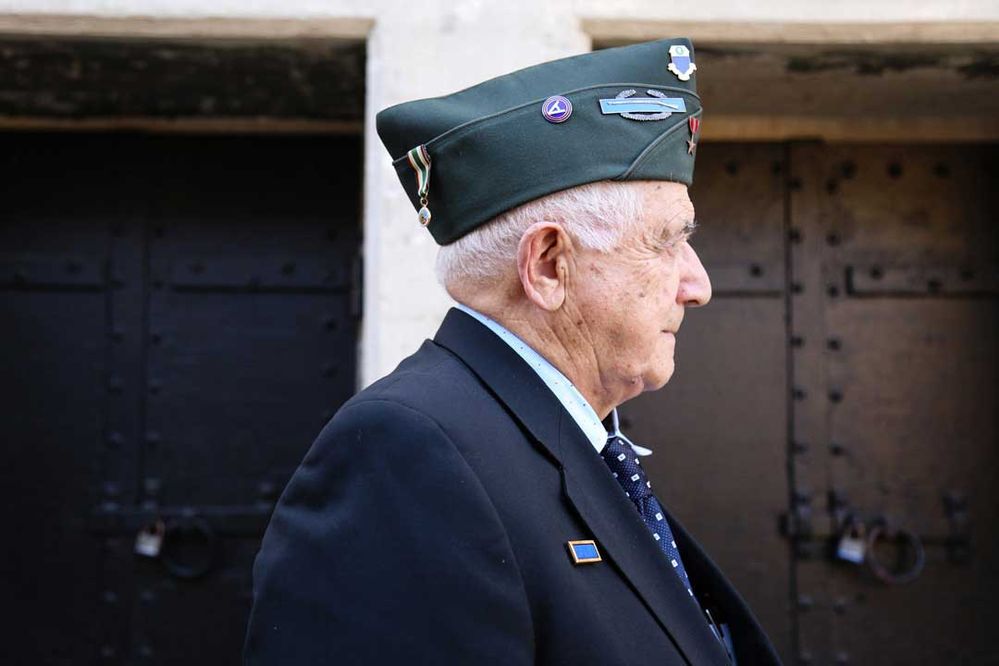
What's your most vivid memory from the war that stays with you the most?
Probably I would say about the sixth of January during the Battle of the Bulge. We were in that field, getting ready to jump off and attack. The Germans were shelling our position. The ground was heaving up and down with the violence of the explosions. That was when I looked over to Harvey Wilson, my friend next to me, feeding my machine gun. I'm yelling at him, ‘Feed them faster, Harvey! Faster!’ I didn't get an answer from him, and I reached over with my foot and I kicked him. ‘Harvey!’ When I looked over, he was lying dead.
And just a few yards away from us, were three more of my buddies. That was… that was very hard. But we kept going, and we jumped off in an attack right then, even though we lost half of our platoon. We had to keep going. And we did.
That was in Bastogne?
That was in Bastogne. Just on the western edge of Bastogne. Actually, there was very little fighting in Bastogne itself, even for the 101st. It was all little towns and villages surrounding it. Bastogne was the heart of the area, and because there was a major crossroads and railroads and everything were coming into there. That was the big importance of Bastogne. I think six, seven main roads diverged on Bastogne. That was why the Germans had to have that.
When you came back from the war, do you remember what the first thing you did when you got back to the United States was?
Oh, gosh, I don't.
Wait, actually yeah I do, now that I think of it. We got off the boat, we came back on the USS West Point, which was a huge transport ship. It had been a civilian ship, the SS America. It was one of these big cruise ships that was converted for military use. We landed in New York Harbor, and they loaded us aboard trains headed over to Fort Dix. It was like three o'clock in the morning, or something like that, when we got there. And we went and had big steak dinners! Steak and milk. We were able to get as much steak as we wanted, and as much milk as we wanted to drink.
See, the thing is, most of us, we may have tried to act like tough old men, but we weren't. Even at that stage, we were still just kids. We were 19, 20 years old.
And you probably couldn't get fresh meat or milk on the front lines.
Oh, no. Not at all.
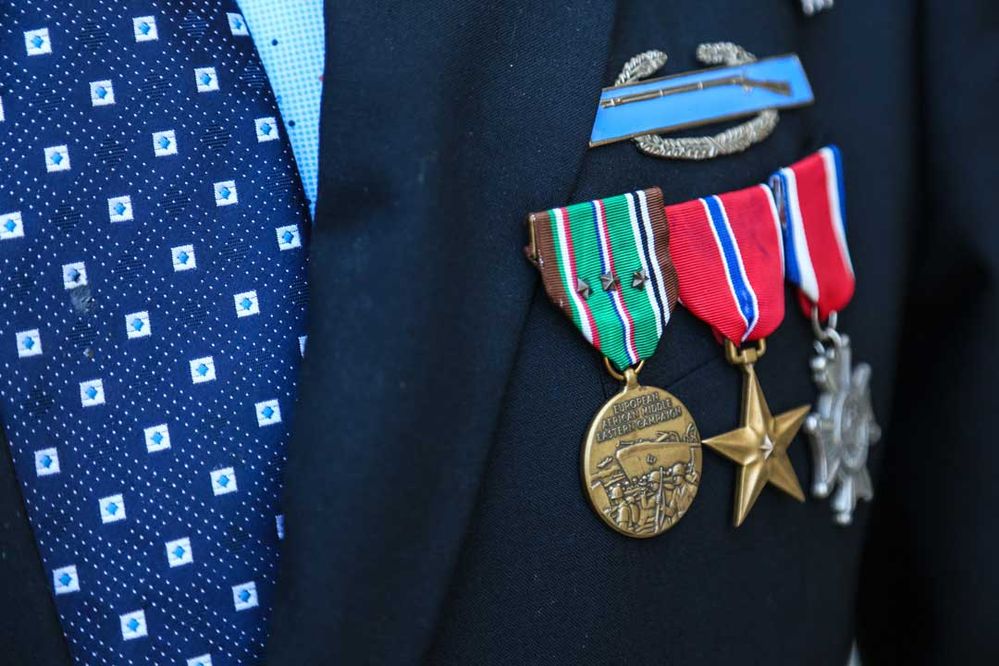
When you went from being a soldier into private life, how did you find that transition, and what did you end up doing as a profession?
Well, I was going to go back to college and finish and get a degree in engineering, but my father and my older brother ran a small plumbing contracting firm, and I discovered I liked working with my hands more than I wanted to sit behind a desk and draw plans or something. So, that's what I did. I went into business with them and eventually took the business over myself years later. My son-in-law is running it now. My dad started it in 1914.
How do you feel the experience was for you as a veteran when you came back? Were you treated well? Were people very respectful of the service?
Oh, yes! We were very well treated, and the thing is, there were so many of us. See, it was different then. Then, everybody was involved in the war to some extent, whether they were a soldier fighting on the front line, or whether they were a woman making cakes or making airplanes. Everybody was involved. People were building airplanes, tanks, battleships, everything like that. Everything was going to the military.
Also, at that time they had these flags that were put up in the windows. It was a blue flag with a white star in the middle of it. And one star meant that there's one member of that family who was in the military. It could have been Army, Navy, Marines, whatever. Didn't make any difference. Everywhere you would see one star, two stars, or like at my house, there were four stars on the flag. There was myself and my three brothers who were all in at the same time. One brother was an Air Force pilot, one was in the Navy Seabees, and other was on a Navy ship. Thankfully, we were very lucky. We all survived.
Also, almost every street in our country had at least one house on the street that had a gold star flag in the window. A flag with a gold star meant that somebody from that house had been killed in the war. And almost every street had at least one. And figure that 400,000 men were killed in that war. And women as well. Nurses and that, they were captured and got caught in gunfire in one way or another.
Our country owes you a great debt. Thank you for your service, and it was a true honor for me to get to talk with you.
Thank you.
We would like to extend a special thank you to both The Greatest Generation Foundation and the Call of Duty Endowment for making this interview possible. Please support both of these organizations, because our veterans deserve the very best.

